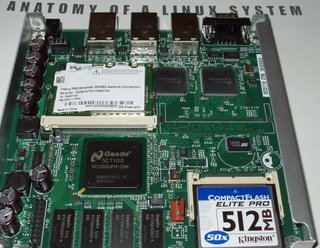OpenBSD WRAP, Intel woes
I have recently been putting together an embedded, do-it-all OpenBSD router box. The only remaining problem is the poorly supported Intel wi-fi card for the mini-PCI slot. The driving motivation behind this project is the necessity of having a low-power, low-noise firewall box for my home network. I guess it would have been easier and cheaper to just get one of the popular Linksys Linux-based routers (certain models in xxx54xxx series). However, I have some experience in building my own freenix-based firewalls, and professional background in embedded devices... In addition the platform is more adaptable and comes with some additional features, like a 10-pin generic I/O interface - could be perfect for driving my Lightget systems and there is even a specific driver for the gpio in OpenBSD!
The driving motivation behind this project is the necessity of having a low-power, low-noise firewall box for my home network. I guess it would have been easier and cheaper to just get one of the popular Linksys Linux-based routers (certain models in xxx54xxx series). However, I have some experience in building my own freenix-based firewalls, and professional background in embedded devices... In addition the platform is more adaptable and comes with some additional features, like a 10-pin generic I/O interface - could be perfect for driving my Lightget systems and there is even a specific driver for the gpio in OpenBSD!Based on a tip from a co-employee I chose the PC Engines WRAP. The setup proved easier than expected. After I had chosen the Flashdist installer script as the basis of my OpenBSD installation system, it took only 3 hours (including IRCing on the side) to figure out which version to use, how to set up the files to be installed, and how to put it on the system and get it running. The method is fairly simple: You untar the OpenBSD packages in a separate directory with Flashdist files, and edit the list of files to be installed. You compile a custom kernel, edit the usual configuration files and add any other stuff you need on the installation. Then you attach a card reader with your compact flash, and run Flashdist so it puts all the files on the card. Put the card back into your WRAP board, attach the serial cable, the power cable, the LAN cables and off you go!
 Previously I had no kind of wireless network, but since I got my hands on the Nokia 770 I have had a need for such as well. There are quite a few wi-fi cards for mini-PCI slot, as that is common in laptops. NRG Systems for example sells Gigabyte cards based on a Ral chipset, but I was told that this is not a very good chipset... so I decided to get Intel's card, as that also was supported by Linux and OpenBSD.
Previously I had no kind of wireless network, but since I got my hands on the Nokia 770 I have had a need for such as well. There are quite a few wi-fi cards for mini-PCI slot, as that is common in laptops. NRG Systems for example sells Gigabyte cards based on a Ral chipset, but I was told that this is not a very good chipset... so I decided to get Intel's card, as that also was supported by Linux and OpenBSD.However. Although Intel apparently supports a driver project for its mini-PCI cards, it's not in a particular hurry to get these working properly on unixoid platforms. The card needs firmware files which are not free to distribute, so you need to download them separately. In theory there are 4 modes of operation: BSS (client), IBSS (ad hoc), monitor and AP modes. Only BSS and monitor are supported by the OpenBSD 3.8 driver. IBSS/ad hoc mode comes with the 3.9 driver, or the Linux driver, and apparently would provide network connectivity for devices like the 770. OpenBSD 3.9 should come out in the next few days, so I'm rather hopeful of getting the system up without having to put Linux on it. If AP mode is desired, one could also run an experimental Linux driver.
The pictures above show the WRAP board and a half of the aluminium case in nice detail. The matchbox is provided for size comparison of the WRAP and 770. Click on the thumbnails for the full-size image.
Technorati tags: wi-fi, wlan, openbsd, wrap, intel, router, firewall

0 Comments:
Post a Comment
<< Home